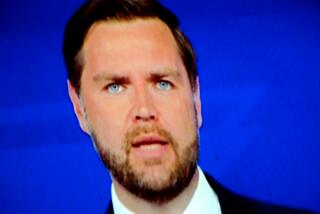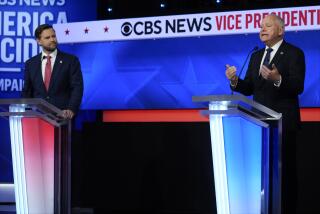Campaigners Set Post-Debate Goals : Democrats Target Quayle, GOP Tries to Shift Attention Back to Dukakis
WASHINGTON — Convinced that Wednesday’s vice presidential debate exposed a major weakness in the Republican ticket, Democrats rushed Thursday to exploit the opportunity with television commercials and stump speeches intended to heighten voter uneasiness about the possibility that Vice President George Bush’s running mate, Dan Quayle, might someday occupy the Oval Office.
The issue could be particularly troubling for Bush, the Democrats believe, because--as he himself has said--the selection of the relatively unknown and inexperienced Quayle was singularly his own. As such, it could appear to be an indicator of his judgment as President.
“I think it was a real plus for us,” Democratic nominee Michael S. Dukakis said as he stumped in Texas. “I think this says something about the way Bush and I make decisions, the kind of people we’re looking for and who we pick.”
Teapot Tempests
What was unclear in the midst of the burst of the Democratic activity was whether, in the long run, the impact of the vice presidential debate would shift basic voter attitudes or, instead, prove to be another of the teapot tempests that mark all presidential campaigns.
The Republicans on Thursday minimized the importance of the debate, which the A. C. Nielsen company estimated was watched by 50 million people. As he campaigned Thursday in Texas and Arkansas, Bush mentioned Quayle’s name only twice, saying in one speech, “Let me tell you, I think Dan Quayle did an outstanding job.”
“The race is quickly going to get back to a race between Bush and Dukakis,” said Bush campaign manager Lee Atwater, reflecting the campaign’s wish to get Quayle out of the news and Dukakis-bashing back in.
Republicans charged that Dukakis’ running mate, Texas Sen. Lloyd Bentsen, had dealt Quayle a low blow when, in the debate’s most dramatic moment, he countered Quayle’s attempt to liken himself to the late President John F. Kennedy by telling him: “Senator, you’re no Jack Kennedy.”
“I think that remark was a cheap shot and unbecoming a senator of the United States,” President Reagan declared Thursday.
But the Democrats, who have been hoping for an opening that might let them catch up with their Republican opposition, were determined to make the most of this one.
For example, the Dukakis campaign swiftly completed production of two commercials aimed at Quayle, due to go on the air this week.
‘Lapse of Judgment’
One, featuring a thumping heartbeat, reminds viewers that one in five American vice presidents has had to rise to the duties of commander in chief. After pointing out that Bush chose Quayle as his running mate “after five months of reflection,” it concludes: “Hopefully, we will never know how great a lapse of judgment that really was.”
In the second commercial, an actor playing a Bush strategist says of Quayle, “We’ve got a disaster on our hands,” and another asks, “Is it too late to drop him? . . . Bring in Bob Dole.” Sen. Dole of Kansas was runner-up to Bush for the presidential nomination and was one of the candidates Bush considered and rejected as his running mate.
Dukakis also stepped up his emphasis on national security issues in his stump speech in an effort to give voters more reason to worry about the possibility of Quayle’s taking over the Oval Office.
“There has been a lot of talk in this campaign about national security. This decision (naming Quayle to the ticket) was an important national security decision because the next vice president may be the commander in chief,” Dukakis said.
It was Quayle’s difficulty in answering a question about how he would behave if he were suddenly thrust into the presidency that led to the put-down from Bentsen, and that was what Democrats seized on as dramatic evidence of the Indiana senator’s lack of experience.
In commenting on Quayle’s hesitancy, Democratic pollster Mark Mellman said: “In effect, he answered the question about what he’d do if he became President by saying, ‘I’d be paralyzed.’ ”
Quayle argued that he had been treated unfairly.
“The question was very vague and hypothetical,” he told reporters. “Frankly, I hadn’t had the question before.”
He said also that he had complained to the moderator and panelists after the debate that not enough questions were asked about foreign policy, which he considers his strength.
In a morning staff meeting Thursday, a senior Quayle adviser said Quayle complained that he was being treated as if he were running for President instead of vice president.
Bush deputy campaign manager Rich Bond said: “I think in Dan Quayle’s situation, the way he has come on the scene under assault from all corners on all levels of his person, that it is understandable to expect that he would try to focus (on) the vice presidency as it supports the presidency.”
Staff writers Douglas Jehl, Cathleen Decker and Josh Getlin contributed to this story.
More to Read
Get the L.A. Times Politics newsletter
Deeply reported insights into legislation, politics and policy from Sacramento, Washington and beyond. In your inbox three times per week.
You may occasionally receive promotional content from the Los Angeles Times.










